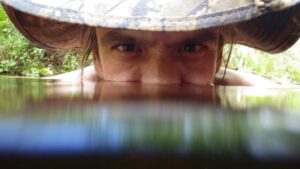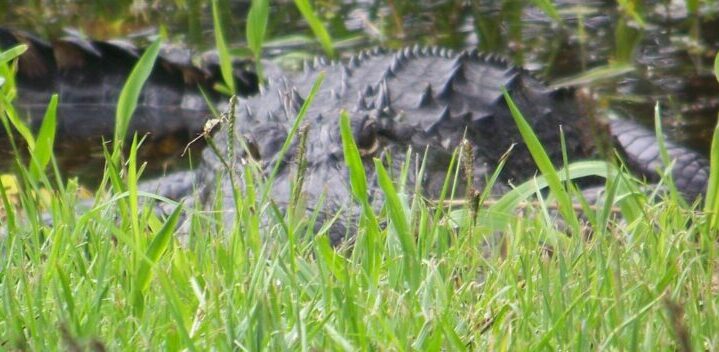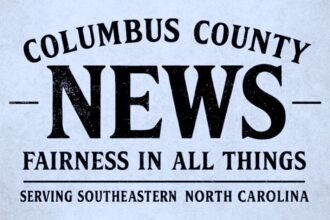It was a lovely spring day, and I thought it might be my last.
I was trapping beavers for a landowner so he could make some improvements on the property. The day was warm, I was already sweating, so I opted to wade out to my deepwater sets. The water was cool, but refreshing, like the perfect first wild swim of every year.
My sidearm was in the truck, and I was armed with just a multi-tool, a large knife, and my potato rake. I didn’t want to get my pistol wet, and figured if there was an attitudinal snake around, the ‘tater rake’ would be fine.
It was a good day: I had two big, fat spring beaver waiting in my sets. As I was half-wading, half-swimming through chest deep brown water back to the truck, I heard and felt the rumble and hiss of a bull gator.
The moment was sobering to say the least. I was pulling two furry $50 bills on a rope behind me in the water, but to the gator those beavers would look and smell like supper. I had no way to defend myself, in the event the gator headed my way. Shoot, I didn’t even know where he was, since the sound echoed through the cypress and vibrated through the water.
I safely made the bank, hauled my catches up in record time, and decided that the rest of my spring nuisance work would be done from the bank.
Had said saurian opted for a bite of castor canadensis with a side of homo sapiens, I would have had no room to argue. After all, he was the apex predator, not me, and I was merely visiting his home.
While that one did make me more than a bit nervous, I’m not inherently scared of alligators. They’ve been here since before humans, and after humans got smart and quit killing them at random, their populations have grown to where they likely should be, according to the people who study such things.

The problem is, wherever you have gators in Southeastern North Carolina, people want to live there, too.
It’s not always a matter of humans destroying habitat, as much as it is humans modifying the animals’ habits. No wild animal is going to voluntarily stay in an area where it is in danger, and no wild animals will go out of their way to bother a human. God’s design is pretty cool that way. Now, if we get in the critter’s way, well, that’s where Darwin comes into play. There’s no guilty conscience in nature – only hunger.
When we had our farm in Kelly, a gator moved in at the little pond at the foot of the hill. She was a good size critter, and eventually attracted a boyfriend. People loved going to see her, and unfortunately, they loved feeding her, too. It was bad enough that Miss Rhonda and I had already accidentally taught her that the sound of a car engine meant food, but in our defense, we never intended to feed her a steady diet of turtles rescued from the road. We unknowingly became a very Darwinian pizza delivery service.
Between the property owner, our own diplomatic entreaties, and a few surprise visits from the Wildlife Enforcement officer, people finally left our girl alone, and eventually she moved away. I saw her again down at the Elwell Ferry, just a mile or so across the swamp. She was missing a vertical scale, so was easily recognizable. If she even noticed me, she was likely disgusted, since I didn’t bring her a turtle.
When animals get used to humans providing food, they naturally hang around more. It’s the basic principle behind baiting deer stands. We really aren’t that different: humans will usually go for the easiest food source available, choosing pizza over a five course meal you have to cook.
Gators are absolutely no different.
People often don’t mean to create bad habits. We think it’s cute to toss food to the ducks and the turtles, but what is actually happening is that Disney cartoon moment will go viewer-discretion-advised National Geographic in 3.2 seconds when a gator realizes there’s a free buffet within swimming distance, at a particular time of day, when certain types of noises are heard on shore.
I knew of a couple alligators down on the coast who never left their particular places outside of seafood houses. There was a regular supply of fishheads, entrails and scavengers who came looking for the offal. All the gators had to do was show up when they heard the fishing boats coming in to dock. They didn’t have negative interactions with people, since people didn’t invade their rather stinky corner of the salt marshes.
At the same time, I know of several gators who are basically one chicken wing away from being killed or removed as a nuisance, since folks insist on buying fried chicken and feeding the gators. They have been known to leave their empty chicken box draped over the state sign warning people of the criminal penalties and physical dangers of feeding dinosaurs.
Gators are big, dangerous and not necessarily smart, but humans can be stupid.
I am not about to blame animals for changing their habits after we move into their habitats; I am no treehugging bunny cuddler. Indeed, I hope to be one of the first in line when our state finally does put a gator hunting season on the books, since I enjoy eating gator, I like alligator leather, I want a gator leg bone for a knife handle, and I think their teeth make cool jewelry.
I admire the critters, even the one I had to scare away from trying to eat my dogs years ago when I was somewhere I had the right to be, but shouldn’t have been. My dogs, the gator and myself came away unscathed, but that’s a column for another day.
Like most Carolina natives and most hunters, I think it’s ridiculous that people move to a place because they love nature, then panic every time they see an alligator, a coyote or a bear. Then there are the ones who self-righteously preach that humans are destroying the habitat, whilst removing native fauna from their manicured lawns, neglecting to secure their pet food and dumping scraps beside the edge of a swamp.
We actually have more alligators, deer and bear in North Carolina now than we did less than fifty years ago. Ask the Wildlife Commission. Those numbers have grown, exponentially in some cases, despite the massive influx of people to our state, and those numbers grew without people intentionally and illegally feeding critters. It’s unlikely we are going to extirpate any of those species through development.
They adapt and adjust. Coyotes live in every major city in North Carolina, and most likely do so voluntarily. I’ve howled at and with coyotes in downtown Burgaw, Whiteville, Elizabethtown, and Clinton. Livin’ is easy for a scavenger in a city. Just like the possum who shares your cat’s food on the back porch, the coyote isn’t going to work any harder than necessary for a meal.
Neither is an alligator.
If you choose to live in a wild area, you’re going to see wild things, and you have to adapt to them – or they will adapt to you. The coyote, bear or possum will move on when there’s no food. The gator will stay put, and eventually become more aggressive, thus resulting in tragedies involving pets or potentially worse, a person.
And the gator will be blamed, as opposed to the people who taught the gator to see humans as a driver for Doordash or Uber-Eats.
There really is no alligator problem in North Carolina. The population is doing very well, thank you very much.
Common sense, however, is an endangered species.







